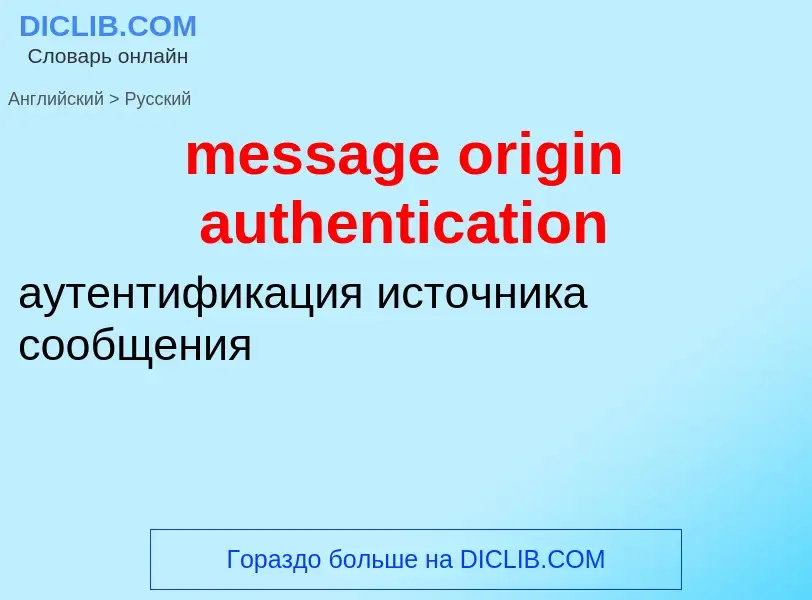Inserisci una parola o una frase in qualsiasi lingua 👆
Lingua:
Traduzione e analisi delle parole tramite l'intelligenza artificiale ChatGPT
In questa pagina puoi ottenere un'analisi dettagliata di una parola o frase, prodotta utilizzando la migliore tecnologia di intelligenza artificiale fino ad oggi:
- come viene usata la parola
- frequenza di utilizzo
- è usato più spesso nel discorso orale o scritto
- opzioni di traduzione delle parole
- esempi di utilizzo (varie frasi con traduzione)
- etimologia
message origin authentication - traduzione in russo
KEYED HASH FUNCTION USED TO PROTECT A MESSAGE'S INTEGRITY AND AUTHENTICITY
Message Authentication Code; Message Integrity Code; Partial MAC; Message footprint; Message authentication codes; Message-authentication code; Message integrity code; Message Integrity Check; Keyed hash function; Authentication tag
message origin authentication
аутентификация источника сообщения
data origin authentication
IN INFORMATION SECURITY
Data authenticity; Authenticity (information security); Data origin authentication; Data-origin authentication; Data Origin Authentication; Message Authentication; Data Authentication; Data authentication; Data origin authenticity; Message authenticity; Data-origin authenticity; Cryptographitcally authenticated; Cryptographic authentication; Cryptographically authenticated
аутентификация источника данных
message authentication
IN INFORMATION SECURITY
Data authenticity; Authenticity (information security); Data origin authentication; Data-origin authentication; Data Origin Authentication; Message Authentication; Data Authentication; Data authentication; Data origin authenticity; Message authenticity; Data-origin authenticity; Cryptographitcally authenticated; Cryptographic authentication; Cryptographically authenticated
аутентификация сообщений
Definizione
message passing
One of the two techniques for communicating between parallel
processes (the other being shared memory).
A common use of message passing is for communication in a
parallel computer. A process running on one processor may
send a message to a process running on the same processor or
another. The actual transmission of the message is usually
handled by the run-time support of the language in which the
processes are written, or by the operating system.
Message passing scales better than shared memory, which is
generally used in computers with relatively few processors.
This is because the total communications bandwidth usually
increases with the number of processors.
A message passing system provides primitives for sending and
receiving messages. These primitives may by either
synchronous or asynchronous or both. A synchronous send
will not complete (will not allow the sender to proceed) until
the receiving process has received the message. This allows
the sender to know whether the message was received
successfully or not (like when you speak to someone on the
telephone). An asynchronous send simply queues the message
for transmission without waiting for it to be received (like
posting a letter). A synchronous receive primitive will wait
until there is a message to read whereas an asynchronous
receive will return immediately, either with a message or to
say that no message has arrived.
Messages may be sent to a named process or to a named
mailbox which may be readable by one or many processes.
Transmission involves determining the location of the
recipient and then choosing a route to reach that location.
The message may be transmitted in one go or may be split into
packets which are transmitted independently (e.g. using
wormhole routing) and reassembled at the receiver. The
message passing system must ensure that sufficient memory is
available to buffer the message at its destination and at
intermediate nodes.
Messages may be typed or untyped at the programming language
level. They may have a priority, allowing the receiver to
read the highest priority messages first.
Some message passing computers are the {MIT J-Machine
(http://ai.mit.edu/projects/cva/cva_j_machine.html) }, the
{Illinois Concert Project
(http://www-csag.cs.uiuc.edu/projects/concert.html) } and
transputer-based systems.
Object-oriented programming uses message passing between
objects as a metaphor for procedure call.
(1994-11-11)
Wikipedia
Message authentication code
In cryptography, a message authentication code (MAC), sometimes known as an authentication tag, is a short piece of information used for authenticating a message. In other words, to confirm that the message came from the stated sender (its authenticity) and has not been changed. The MAC value protects a message's data integrity, as well as its authenticity, by allowing verifiers (who also possess the secret key) to detect any changes to the message content.

